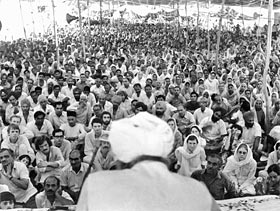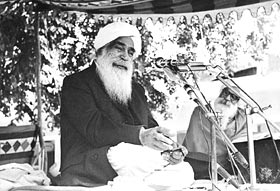Satsang
The Master comes for the sinners. He takes those who come to Him, up for a while. But to stay up there requires purity. So to even the most sinful, the Master gives a boost and takes him above body consciousness, gives him a peep through the Door; and he sees Light. Whether good or bad, sinful or virtuous, the Master gives them all first a boost to come up. Then, if they are not attached to the world too much, they will be able to remain there. For that reason they must become purer. So He gives His hand to everybody, even the most sinful. He loves the sinner but hates the sin. He gives all who come to Him a boost and something to start with. Unless a man is raised, taken up, how can he see the Light? So when he reaches It, it is just like a man who had gone onto the roof by going up the stairs. When he gets near the roof he sees light. When he is withdrawn from outside and rises above body consciousness, he comes nearer to the place where that Door is, the tenth Door, and only then is he able to see the Light. This the Master gives to everybody. But the point is, if a man is attached too much to the world, naturally he must be changed; for that reason he is asked to lead a very virtuous life.
Sant Kirpal Singh
In Sawan Ashram, Delhi, people came together from all over the world. From Dr Harbhajan Singh we came to know about the Satsang shown in the picture at the left side:
Master was holding a Satsang in Hindi. He had told me to sit with the foreigners and to translate for them. Obeying the order of the Master I sat with them, but I had no practice in translating. Only every few minutes I was able to tell them something. First Master would look at me off and on, but then one time Master looked very minutely and attentively at me. Thereafter I was able to translate more. That was a wonderful thing.
Master often called Dr Harbhajan Singh to come on the stage and to speak in the Satsang about incidence which happened in the Amritsar area. This is one of those incidences showing the Grace of the Master:
A woman named Harjit Kaur from the Verka District near Amritsar, who was my relative, came to my house. When she saw Master's picture there, she told that she was also initiated (by a so-called master). There was another person whom I was telling the theoretical aspect of life, and she listened carefully, too. After I had finished she said that it was right that this is a Master who gives the first-hand experience above the senses and the shackles of the mind, whereas she had not had that experience from her master. "My Master tells to all that he is responsible for all of them. He stresses to put in many, many hours, some put in 8 hours for meditation, but still they don't get that very experience which you are speaking of, and which is also in accordance with the teaching of the Guru Granth Sahib." She asked me, "Am I also such a fortunate to have this initiation?" I said, "Yes, you can have it."
After about one month later Master visited Amritsar. She had told about the Master to some persons during this time, and all came to listen to Master, but her husband did not allow her to hear the Satsang.
At that time it was extreme hot weather. She fell sick with acute meningitis, and the attending doctor referred the case to the Government hospital, whereas she insisted on her husband to visit my hospital at Nag Kalan. When she was brought, her condition had alarmingly deteriorated. She was given a glucose infusion with which she was able to talk, but I asked her husband to shift her immediately to the Government Hospital. Her husband went to get leave from his office, but he did not return until evening.
She told me that she had come to get the promise fulfilled. I asked her, "Why did you not come to see the Master?" She answered that it was not her fault, but her husband had not allowed her to go. After every 10 to 15 minutes she repeated her question. In the evening she asked me for a glass of cold water. After she had taken one glass, she asked my wife for another one. After taking both the glasses, she closed her eyes and in a moment she left the body.
Seeing this we got very much worried, and we prayed to the Master as why she had left her body in our house, she should have died among her children and her husband. We were sitting beside her and after an hour she came back into the body and opened her eyes. We felt very happy and put her questions. She replied that she had left her body, and the way her soul found was burning like fire. She saw her previous master sitting on the hot sand and a lot of his disciples were crying with him. She told further that she felt, that was not her way and the same moment one old person caught hold of her shoulder and told her, "Your way has been changed now." She said, "Thereafter he had taken me to a place where I felt comfortable, and I enjoyed my stay there. But He told me that my decision would be taken on the birthday of His Master Baba Sawan Singh Ji on 27 July." It was then the 22 July.
I told this incidence on the celebration of Baba Sawan Singh Ji's birthday with due permission of the Master. Master said that all those who yearn and want the Grace from the Masterpower would be forgiven that day.
Harbhajan Singh
Celebration Of Guru Nanak's Birthday 2 November, 1969
Guru Nanak's five-hundredth birthday was celebrated at Sawan Ashram, Delhi, with a six-hour Satsang, attended by religious leaders of all faiths and about 30 000 people.
In 1969, at the request of the Indian Government, Sant Kirpal Singh wrote an article about Guru Nanak which appeared in newspapers and magazines all over India under the title "Guru Nanak and His Teachings".
Sant Kirpal Singh also translated the Jap Ji from Punjabi into English, with an illustrious commentary, which in its deepness creates longing to understand the teaching and to live with it. It was published in 1959. Jap Ji is the beautiful hymn of Guru Nanak which appears as a prologue to the Guru Granth Sahib, the voluminous scriptural treasure of the Sikhs, which comprises over 1400 pages. The Jap Ji lays down the basic principles of His teachings and explains the means to achieve atonement with the One Being, the Creator of all.
It seems impossible to refer to Guru Nanak without reciting some of His supreme stanzas, which we are fortunate to have translated from the original Punjabi text into English by a Master-Saint.
By practice of the Word,
One rises into universal consciousness
And develops right understanding;
By practice of the Word,
One develops clairvoyance
And transvision of the whole creation;
By practice of the Word,
One is freed from sorrow and suffering;
By practice of the Word,
One shall not go to Yama after his death.
O, great is the Power of the Word,
But few there be that know it.
– Stanza 13 –
"Yama": It is known to the men who know of the world beyond, that at the time of shaking off the mortal coil, souls are ushered into the other world by certain messengers who are the angels of death. Sinners are badly treated by them, while the others are invariably led before Yama, the king of death. But one who practises the Word escapes Yama altogether; for he is received at the astral world by the radiant form of the Master and is escorted by Him to the spiritual planes.
Let contentment be your ear-rings,
And endeavour for the Divine
And respect for the Higher Self be your wallet,
And constant meditation on Him be your ashes.
Let preparedness-for-death be your cloak,
And let your body be like unto a chaste virgin.
Let your Master’s teachings be your supporting staff.
The highest religion is to rise to Universal Brotherhood,
Aye, to consider all creatures your equals.
Conquer your mind,
For victory over self is victory over the world.
Hail, Hail, to Him alone,
The Primal, Pure, Eternal, Immortal, and Immutable
In all ages!
– Stanza 28 –
Carrying on his substitution of the outer practices of the yogins by inner spiritual disciplines, Nanak recommends that we should make Divine knowledge our food (man does not live by bread alone), inculcate charity and mercy, and attune ourselves to the Music of the Divine Word.
Nanak also forestalls the dangers that lie on the spiritual journey. Not only is wealth a hindrance, but the power one gains through self-discipline and partial spiritual attainment may itself become an obstacle in the way of fuller realization. One begins to practise these occult powers, and, absorbed in them, one tends to forget the real goal. Nanak, therefore, warns us against this possibility. Once we have begun the journey God-wards, we must not rest, waver or wander on the way.











